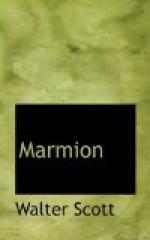These, and many such verses, were repeated, but by rote, and unconnectedly. There were also, occasionally, I believe, a Saint George. In all, there was a confused resemblance of the ancient mysteries, in which the characters of Scripture, the Nine Worthies, and other popular personages, were usually exhibited. It were much to be wished that the Chester Mysteries were published from the Ms. in the Museum, with the annotations which a diligent investigator of popular antiquities might still supply. The late acute and valuable antiquary, Mr. Ritson, showed me several memoranda towards such a task, which are probably now dispersed or lost. See, however, his “Remarks on Shakspeare,” 1783, p. 38.
’Since the first edition of “Marmion” appeared, this subject has received much elucidation from the learned and extensive labours of Mr. Douce; and the Chester Mysteries (edited by J. H. Markland, Esq.) have been printed in a style of great elegance and accuracy (in 1818) by Bensley and Sons, London, for the Roxburghe Club. 1830.’—Scott.
line 93. The proverb ‘Blood is warmer than water’ is also common in the form ‘Blood is thicker than water.’
line 96. ’Mr. Scott of Harden, my kind and affectionate friend, and distant relation, has the original of a poetical invitation, addressed from his grandfather to my relative, from which a few lines in the text are imitated. They are dated, as the epistle in the text, from Mertoun-house, the seat of the Harden family:—
“With amber beard,
and flaxen hair,
And reverend apostolic
air,
Free of anxiety
and care,
Come hither, Christmas-day,
and dine;
We’ll mix
sobriety with wine,
And easy mirth
with thoughts divine.
We Christians
think it holiday,
On it no sin to
feast or play;
Others, in spite,
may fast and pray.
No superstition
in the use
Our ancestors
made of a goose;
Why may not we,
as well as they,
Be innocently
blithe that day,
On goose or pie,
on wine or ale,
And scorn enthusiastic
zeal?—
Pray come, and
welcome, or plague rott
Your friend and
landlord, Walter Scott.
“Mr.
Walter Scott, Lessuden”
’The venerable old gentleman, to whom the lines are addressed was the younger brother of William Scott of Raeburn. Being the cadet of a cadet of the Harden family, he had very little to lose; yet he contrived to lose the small property he had, by engaging in the civil wars and intrigues of the house of Stuart. His veneration for the exiled family was so great, that he swore he would not shave his beard till they were restored: a mark of attachment, which, I suppose, had been common during Cromwell’s usurpation; for, in Cowley’s “Cutter of Coleman Street,” one drunken cavalier upbraids another, that, when he was not able to afford to pay a barber, he affected to “wear a beard for the King.” I sincerely hope this was not absolutely the original reason of my ancestor’s beard; which, as appears from a portrait in the possession of Sir Henry Hay Macdougal, Bart., and another painted for the famous Dr. Pitcairn, was a beard of a most dignified and venerable appearance.’— Scott.




